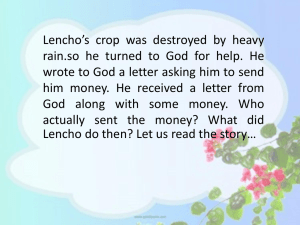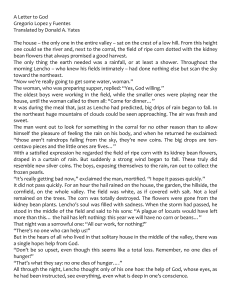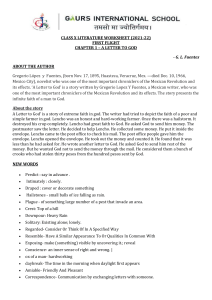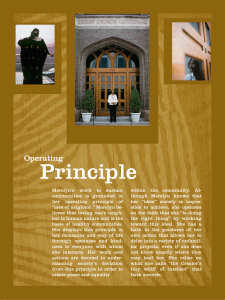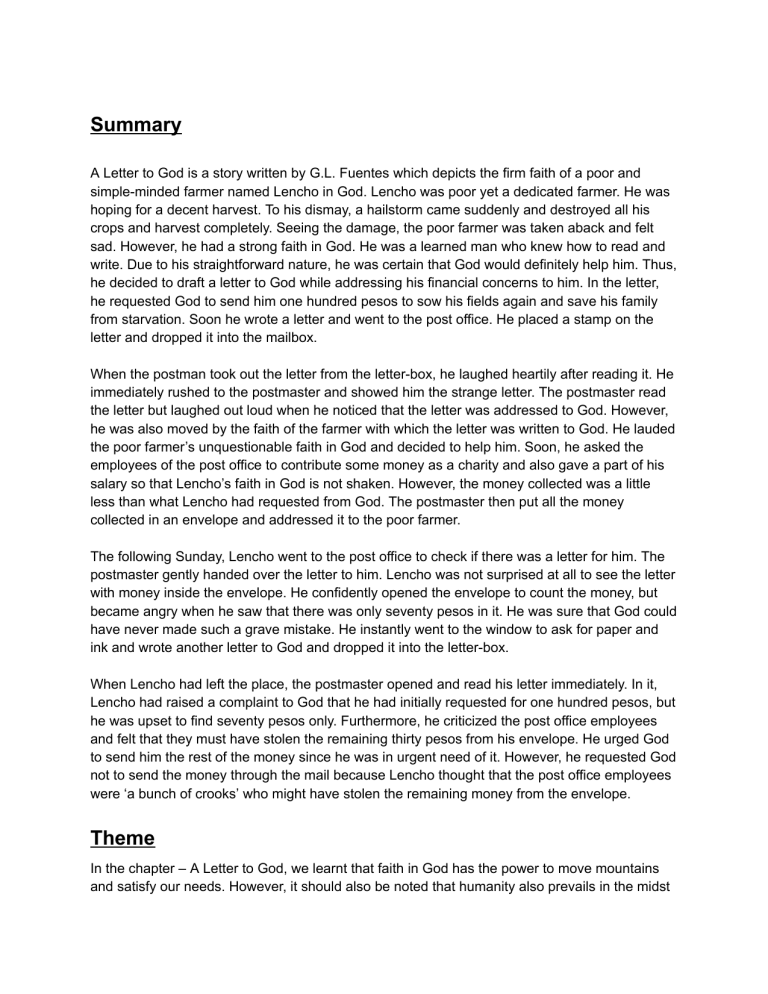
Summary A Letter to God is a story written by G.L. Fuentes which depicts the firm faith of a poor and simple-minded farmer named Lencho in God. Lencho was poor yet a dedicated farmer. He was hoping for a decent harvest. To his dismay, a hailstorm came suddenly and destroyed all his crops and harvest completely. Seeing the damage, the poor farmer was taken aback and felt sad. However, he had a strong faith in God. He was a learned man who knew how to read and write. Due to his straightforward nature, he was certain that God would definitely help him. Thus, he decided to draft a letter to God while addressing his financial concerns to him. In the letter, he requested God to send him one hundred pesos to sow his fields again and save his family from starvation. Soon he wrote a letter and went to the post office. He placed a stamp on the letter and dropped it into the mailbox. When the postman took out the letter from the letter-box, he laughed heartily after reading it. He immediately rushed to the postmaster and showed him the strange letter. The postmaster read the letter but laughed out loud when he noticed that the letter was addressed to God. However, he was also moved by the faith of the farmer with which the letter was written to God. He lauded the poor farmer’s unquestionable faith in God and decided to help him. Soon, he asked the employees of the post office to contribute some money as a charity and also gave a part of his salary so that Lencho’s faith in God is not shaken. However, the money collected was a little less than what Lencho had requested from God. The postmaster then put all the money collected in an envelope and addressed it to the poor farmer. The following Sunday, Lencho went to the post office to check if there was a letter for him. The postmaster gently handed over the letter to him. Lencho was not surprised at all to see the letter with money inside the envelope. He confidently opened the envelope to count the money, but became angry when he saw that there was only seventy pesos in it. He was sure that God could have never made such a grave mistake. He instantly went to the window to ask for paper and ink and wrote another letter to God and dropped it into the letter-box. When Lencho had left the place, the postmaster opened and read his letter immediately. In it, Lencho had raised a complaint to God that he had initially requested for one hundred pesos, but he was upset to find seventy pesos only. Furthermore, he criticized the post office employees and felt that they must have stolen the remaining thirty pesos from his envelope. He urged God to send him the rest of the money since he was in urgent need of it. However, he requested God not to send the money through the mail because Lencho thought that the post office employees were ‘a bunch of crooks’ who might have stolen the remaining money from the envelope. Theme In the chapter – A Letter to God, we learnt that faith in God has the power to move mountains and satisfy our needs. However, it should also be noted that humanity also prevails in the midst of one’s faith in the Almighty. This story beautifully sketches Lencho’s deep faith in God and how the post office employees helped him anonymously by contributing money from their pockets to help the poor man in crisis. Adjectives to describe the character of Lencho Naive, ungrateful, true believer, materialistic, insightful, introvert, hardworking, credulous, stupid, ingenuous, heedless, unthankful, acquisitive, profane, temporal, sensual, unspiritual, divine, intuitive, perceptive, sagacious, autistic, narcissistic, assiduous, diligent, sedulous. Character sketch of Lencho Ans – 1. A Hardworking Farmer – Lencho was a simple man and a hardworking farmer. He worked like an ox in his field. 2. Love For Family – Lencho’s entire crop was badly destroyed by the hailstorm. So, he became very sad as he was worried about his family. 3. An Optimistic Person – Although his only source of living was taken away, he didn’t lose hope. He had his last hope in God. He was confident that God would help him in his distress. 4. An Innocent Man – Lencho didn’t know that there was no such living person as God who could send him money, which shows his innocence. 5. Strong Belief in God – Lencho had firm faith in God as he sought help from God when his crop was destroyed. He wrote Him to send a hundred pesos. But when he received seventy pesos, he called the post-office employees a bunch of cooks. He rewrote a letter to God from the remaining thirty pesos, which shows his firm faith in God. Adjectives that describe Lencho's Wife Faithful, practical, supportive, Veracious, constructive, empirical, pragmatic Adjectives that describe postmaster Kind, generous, matured, determined, compassionate, fosters a sense of community building, spreads positivity, helpful, empathetic, good leadership qualities, emotional, composed, sensitive, understanding Character sketch of postmaster It takes all kinds of people to make this world. The postmaster has all that is good in human thinking and behavior. He has a thorough understanding of a sharp and sensitive mind. He knows how the mind of a God fearing rustic like Lencho works. He is sensitive and sympathetic to human feelings. He doesn't want to break the deep faith of the writer in God. The fat and friendly postmaster had a large heart too. First, he laughed at the man who wanted to have a direct correspondence with God. But he soon became serious. After reading the letter, he was deeply moved and impressed by Lencho's faith in God. He knew that merely goodwill was not sufficient. But he stuck to his resolution which shows that he is helpful. The farmer needed financial help. So he collected a sum of 70 pesos from his employees. He also contributed a part of his salary. This shows that he fosters a sense of community building. He did so as to keep Lencho's faith in God. This shows his empathetic nature towards people.He wrote a single word as a signature: God. It is ironic that a simpleton like Lencho could never know his real benefactor. Nor did he ever try to know how and from whom he received those seventy pesos. Naturally, the postmaster's work of charity deserved a better recognition and appreciation from the receiver. Adjectives for Lencho's faith Extreme, unshakeable, invincible, insurmountable, unbreakable, strong, blind, unquestionable, innocent, true, firm, unbelievable, incredible, undying, insuperable, unwavering, peerless QUESTIONS 1Q. ‘Lencho was an ox of a man, working like an animal in the fields, but still he knew how to write.’ What does this line tell us about the norm amongst such farmers, then? A. Lencho was an extremely hard working farmer. Unlike the other farmers, he was literate and knew how to write. He decided to write a letter to God, seeking help from him. 2Q. What, according to you would have been the likely reaction of Lencho’s wife upon knowing about him writing an actual letter to God.’ A. Lencho’s wife would not have supported his idea. She would have preferred praying to God as a way to seek help. The woman would not have had such blind faith as to think that she could send a mail to God. 3Q. Lencho waited eagerly for a reply to his letter to God. Do you think the postmaster was also very keen to know Lencho’s reaction upon receiving the ‘reply’? A. Yes, The postmaster was keen to know Lencho’s reaction. As soon as Lencho mailed the second letter, he opened the envelope to read it. 4Q. What were Lencho’s feelings when he found the letter with money in it? What did he do after opening the letter? A. Lencho was so confident that he did not show any surprise on seeing the letter. Later, when he counted the money, he became angry because it was less than the amount that he had asked for. 5Q. Why would you not agree with Lencho calling them ‘a bunch of crooks’? A. Lencho was not at all justified in calling them ‘a bunch of crooks’. The postmaster and the staff at the post office had collected money for him. They tried to gather the maximum amount for him. 6Q. How did Lencho’s hope change to despair? A. Lencho had hoped for rain which would provide a better harvest of the crop in his field. When the rain turned into a hailstorm, his hope changed into despair because the hailstorm would destroy his crop. 7Q. ‘The field was white, as if covered with salt.’ This is how the field is described after the hailstorm. The pelting hailstones could have been easily seen as sugar cubes. Do you think comparing it with sugar would have been more appropriate? Why/ Why not? A. The writer compares the hailstones to salt. This comparison is better because when salt gets damp, it gains weight and settles down just like the hailstones did. On the other hand, sugar cubes would have melted in the water and the colour would not remain visible for long. 8Q. Lencho and his family knew the implications the hailstorm would have on their lives. Write a conversation between Lencho and his wife as they watched the downpour turn to a hailstorm. A. Lencho: Oh God! There is a hailstorm. Our crop will get destroyed. Wife: Hurry up! Do something. Cover the field with the net. Lencho: It is too late now. The field is covered with hailstones now. The entire corn is destroyed. We have nothing to eat. Wife: Don’t worry, God is there. No one dies of hunger. 9Q. Lencho did not bother exploring any other means to resolve his situation but just turned to God. Do you feel that his approach was justified? Why/Why not? A. Value points – Not justified – blind faith in God – but God helps those who help themselves – should have made efforts to solve his problem – writing a letter to God is no resolution to a problem. 10Q. Why did Lencho write a letter to God? A. The hailstorm had destroyed Lencho’s crop. He was left with neither money nor food. They would remain hungry throughout the year. Lencho’s only hope was help from God. His deep faith in God made him write a letter to God seeking help in the form of 100 pesos. 11Q. Lencho seemed to be an impulsive man who felt suddenly elated at the rainfall and later became sad to see the destruction which the rain had caused. Did he lack tolerance? Did he not have the courage to face the challenges of life? Elucidate it by discussing the values one must possess to face any type of situation. A. Lencho was impulsive but he did not lack tolerance. His entire crop was destroyed but he was courageous. His faith in God was the last resort which made him write the letter. He was seeking monetary help so that he could sow the crop and feed his family. 12Q. The postmaster represents the people who still believe in helping others. Mention those values of the postmaster which you would like to emulate. A. The postmaster was a kind hearted man. He was moved by the poor farmer’s deep faith in God. He gave up a part of his salary and asked his colleagues to donate as well. He collected 70 Pesos and gave it to Lencho in the form of a letter from God, to retain his faith. 13Q. The people at the post-office contribute to put together whatever they can manage, for Lencho. (a) What do you think was the main reason behind their help? Would you have done the same if you were one of the employees? (b) As an employee, write about your perspective and reason(s) for contributing to the fund. The fact that you don’t want to say ‘no’ to a cause initiated by your boss, can also be an equally compelling reason! A. Value points. (a) Post office staff was under the pressure of the boss – could not refuse him – did not have spare money but had to donate. (b) the poor farmer’s faith moved me – decided to help him – wanted to retain his faith in God. 14Q. Read the given anecdote and analyse the similarities and differences with reference to ‘A Letter to God’. A very poor woman called-in a radio station asking for help from God. A non-believer, also listening to this radio program, decided to make fun of the woman. He got her address, called his secretary and ordered her to buy food and take it to the woman. However, the instruction was: “When the woman asks who sent the food, tell her that it’s from the devil.” When the secretary arrived at the woman’s house, the woman was very happy and grateful for the help. The Secretary then asked her, ”Don’t you want to know who sent the food?” The woman replied, ”No, I don’t even care because when God orders, even the devil obeys! A. Value points Poor woman is like Lencho. Blind faith in God. Helper is not like Postmaster. He wants to mock her. Postmaster was kind-hearted and wanted to restore Lencho’s faith in God. 15Q. The postmaster was a representative of God. Evaluate this statement in the context of your understanding of ‘A Letter to God”. A. Value points Postmaster was a messenger of God. He wanted to restore Lencho’s faith in God. (Add details of how the crop was destroyed and Lencho’s reaction). 16Q. There are two kinds of conflicts in the story: between humans and nature, and between humans themselves. How are these conflicts illustrated? A. The conflict between humans and nature is illustrated in the following way. A farmer’s healthy crop gets destroyed by the hailstorm lashed by nature. The storm is so furious that not a leaf remains on the trees. The field turns white with the hailstones. The farmer, Lencho is left with no crop, food and money. Thus, nature’s conflict with man has been illustrated in the story. The conflict between humans is depicted in the following way. The postmaster is moved by Lencho’s faith in God. He tries to help him and to retain the faith, collects money and gives it to Lencho. But when Lencho sees that he amount is lesser than what he had asked for, he doubts the staff of the post office and calls it a bunch of crooks. Thus, the man doubts those who helped him. Thus, we get to see the conflict between humans.
